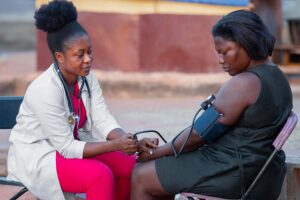When someone is diagnosed with a life-threatening illness like leukemia or lymphoma, a bone marrow transplant can be their only hope for survival. However, despite the life-saving potential of this procedure, the number of available bone marrow donors remains low in Nigeria. This is where your involvement becomes vital. Donating bone marrow is a heroic act that can save lives, and understanding the process can inspire more individuals to step forward.
What is Bone Marrow Donation?
Bone marrow is the soft, spongy tissue inside your bones that produces blood cells. When someone has a condition that affects their bone marrow, such as leukemia or severe anemia, a transplant from a healthy donor may be their only option. This is where bone marrow donation plays a critical role in saving lives.
Unlike blood donation, where whole blood or plasma is donated, bone marrow donation involves extracting healthy stem cells that are used to replace a patient’s damaged bone marrow. While the procedure may seem intimidating, it is a life-changing experience for those in need.
Why is Bone Marrow Donation So Important in Nigeria?
In Nigeria, a growing number of people are diagnosed with blood-related cancers, such as leukemia, and other conditions that require a bone marrow transplant. However, the shortage of bone marrow donors has made it difficult for many patients to access this life-saving treatment. This lack of available donors leads to higher mortality rates and longer wait times for patients in need.
The need for bone marrow donors in Nigeria is real, and you can be the hero who steps in to save a life. When you donate, you offer hope to individuals battling critical health conditions.
How Bone Marrow Donation Works
The process of donating bone marrow is typically straightforward and safe. Before you donate, you’ll undergo a series of tests to ensure you are a match for a patient in need. These tests will check your blood type, genotype, and your body’s compatibility with the recipient’s bone marrow. It is crucial to understand that the process is similar to blood donation in terms of preparation, but bone marrow donation may require some additional time and care.
-
Screening and Testing: After registering, you will undergo a series of tests to determine if you are a suitable match for the recipient. These include blood tests, which will help verify your blood group, rhesus factor, and genotype.
-
Collection: There are two methods for collecting bone marrow. One method involves taking the marrow from the pelvic bone using a needle. The other, a newer technique, is the peripheral blood stem cell donation (PBSC), which is similar to giving plasma. The collection process takes several hours and may require a hospital stay.
-
Recovery: The recovery time is typically quick, with most donors returning to their normal activities within a few days. The body will naturally replenish the donated bone marrow within weeks.
The Benefits of Blood Donation and Bone Marrow Donation

Giving blood, plasma, or bone marrow can significantly impact the health of others. Besides saving lives, bone marrow donation offers multiple health benefits for donors. When you donate blood, it helps reduce the iron levels in your body, which can be beneficial to your health. Additionally, research suggests that blood donation may also improve skin health due to the rejuvenating effects of blood circulation.
For individuals who are interested in donating plasma, plasma centers in Nigeria play an essential role in collecting blood plasma, platelets, and stem cells, all of which are used to treat different medical conditions. Donors can also choose to sell plasma or donate it to those in need. Selling plasma can also help individuals who want to contribute in other ways but may not be ready for bone marrow donation.
The Risks of Not Donating: Why Your Contribution Matters
The shortage of blood donors and bone marrow matches can lead to significant health risks for patients in need. Without access to a sufficient number of bone marrow donors, patients may not receive the treatment they desperately need. This lack of donations can also delay crucial surgeries and treatments, leading to higher medical costs and increased patient suffering.
By choosing to give blood or donate bone marrow, you help ensure that those who are suffering from life-threatening conditions have a chance at recovery. Your donation helps to bridge the gap and ensures that no one has to wait longer for the treatment they deserve.
How You Can Help: Take Action Today
You don’t have to wait for a life-threatening situation to get involved. You can donate blood or register to become a bone marrow donor today. Many hospitals and blood centers in Nigeria offer opportunities for donation. Oneus, a trusted blood donation service provider, works to make the donation process accessible and easy. You can contact Oneus to learn more about blood donation, bone marrow donation, plasma donation, and other ways to help those in need.
Give Blood, Save a Life – Book Your Donation Now!
Contact us at info@oneusng.com, +234 902 168 2822 or visit Oneusng.com to learn more and take action today.
By donating blood, plasma, or bone marrow, you are making a lasting impact. Join the movement and help save lives in Nigeria.




